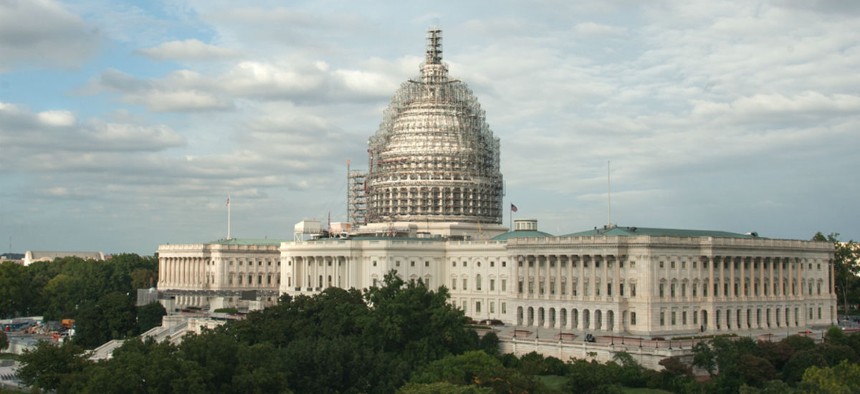
Architect of the Capitol
Sunshine Week Brings Senate Passage of FOIA Improvement Bill
Advocate of the legislation had urged its passage during an event Monday highlighting transparency programs.
The Senate on Tuesday passed its version of the Freedom of Information Act Improvement bill, a day after a key backer lauded it during a Sunshine Week event showcasing an array of transparency programs at the National Archives and Records Administration.
“The FOIA Improvement Act will help open the government to the 300 million Americans it serves and ensure that future administrations place an emphasis on openness and transparency,” said Sen. Patrick Leahy, D-Vt., after the unanimous vote he had advocated during his Monday appearance at NARA.
“An open and transparent government is paramount to a healthy democracy, and today’s vote sends a clear message that the American people have a fundamental right to know what their government is doing,” said Sen. John Cornyn, R-Texas, a chief sponsor of the bill that would require agencies to operate under a “presumption of openness” and reduce the overuse of exemptions to withhold information from the public.
The House, having passed a different version in January, is expected to consider the Senate version. House version co-sponsor, Rep. Elijah Cummings, D-Md., issued a statement calling on Speaker Paul Ryan, R-Wis., “not to repeat the mistakes of his predecessor and bring the Senate bill to the floor as soon as possible. There would be no better way to celebrate Sunshine Week than to send FOIA reform legislation to the president’s desk.”
At Monday’s symposium, Archivist of the United States David Ferriero highlighted FOIA’s history and some of his agency’s 120 actions taken to improve transparency and collaboration since 2010. They include expanding partnerships with citizen activists and crowd sourcing. The Archives is co-chairing the government’s interagency open government working group and is helping prepare, by June, the Obama administration’s for fourth open government plan.
At least 600 federal employees have taken the Archives’ training in FOIA procedures, Ferrerio added. Its six-year-old Office of Government Information Services, which resolves interagency FOIA disputes, he said, “is in the best position to facilitate change.”
Richard L. "Dick" Huff, former co-director of the Justice Department’s Office of Information Policy, presented an overview of legal cases establishing agency exceptions to full release of documents. Among the issues raised in the seven cases (six of which affirmed agency denials of request, were whether text messages are covered by FOIA (they are); whether some requests are unreasonably burdensome (as when human eyes needed to skim for names to redact 20 million electronic complaints to the Federal Trade Commission); whether drafts of national security documents should remain classified even after decades as part of the deliberation process; whether the Homeland Security Department can withhold documents that would betray law enforcement capabilities and responsibilities; whether federal law requires law enforcement agencies to release mug shots of arrestees; and whether intelligence agencies can withhold documents if their release would implicitly confirm existence of a secret program.
The Archives invited allies in the nonprofit and academic world to discuss the roadblocks they encounter in accessing federal records. Michael Morisy, founder of MuckRock, said he hopes ”to encourage better FOIA requests, fewer that ask for all documents.” He recommended that more agencies use Gmail so that email content is fully searchable and “so we can get to the point where FOIA is not a huge burden but built into the process.”
Pam Wright, the Archives’ chief innovation officer, gave an overview of her agency’s online outreach efforts on Facebook, Pinterest, Twitter, Tumblr, Wikipedia and through its blogs. “We have cracked open our collection” through such features as the agency’s online citizen archivist dashboard and history hub, which draw on the expertise and volunteer labor of nongovernmental archivists and history enthusiasts, she said “It’s no longer just about sharing records, but re-sharing resources,” she added, noting that fully 200 Archives staffers “contribute regularly to our external platforms.” The Archives website is now drawing 80 million page views annually, while its entries on Wikipedia attract 1 billion a year.







